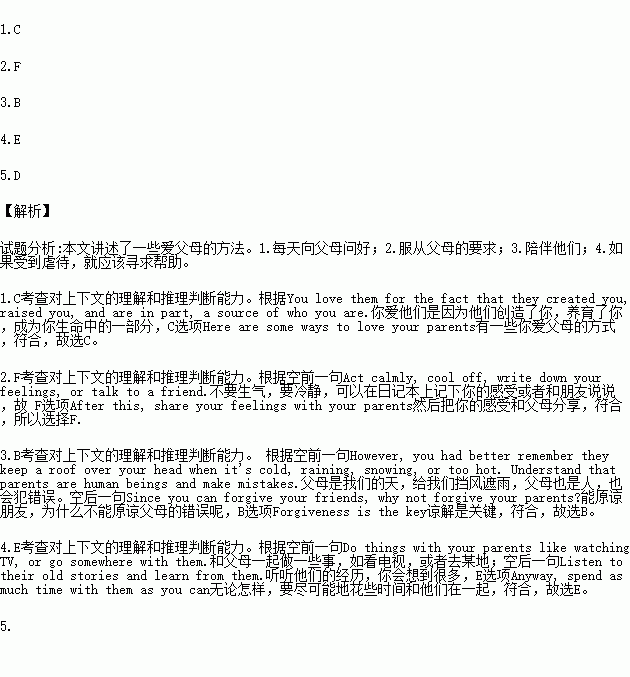题目内容
根据短文内容,从短文后的选项中选出能填入空白处的最佳选项。选项中有两项为多余选项。
How to Love Your Parents
Even if you think that your parents are mean-spirited(小心眼的) at times, loving your parents is a normal and fulfilling part of life. You love them for the fact that they created you, raised you, and are in part, a source of who you are. 1. .
Tell them you love them every morning. A gentle "good morning" and "I love you" will warm a coldest heart. Remember that they brought you into this world. Without your parents, we might still wander at an unknown corner in an unknown world.
Respect them more and cherish(珍惜) these moments. You can use these moments to learn from them, preparing yourself for when you're off on your own. It's OK to get angry but angry actions don't help you or your parents. Act calmly, cool off, write down your feelings, or talk to a friend. 2. .
Obey their requests. It will make your attitude better and earn you more respect from them.It may seem as if you are going through hell(吃苦受罪) when you don't get what you want or you have to clean. However, you had better remember they keep a roof over your head when it's cold, raining, snowing, or too hot. Understand that parents are human beings and make mistakes. 3. .Since you can forgive your friends, why not forgive your parents?
Keep them company. Do things with your parents like watching TV, or go somewhere with them. 4. Listen to their old stories and learn from them. You will find they are your teachers in this way or another.
Some people simply may not be able to love their parents. 5. Seek help if you are being abused(虐待)in anyway. Parents do not have a right to harm you.
A. Parents will in turn express their love to you.
B. Forgiveness is the key.
C. Here are some ways to love your parents.
D. There can be realistic reasons for this, family violence for example.
E. Anyway, spend as much time with them as you can.
F. After this, share your feelings with your parents.
G. Please remember parents are as important as friends.

